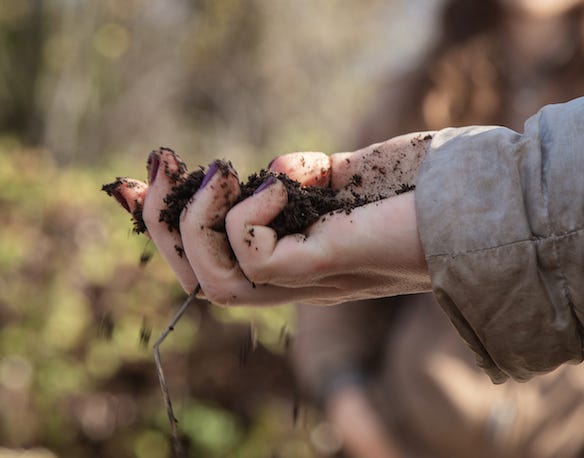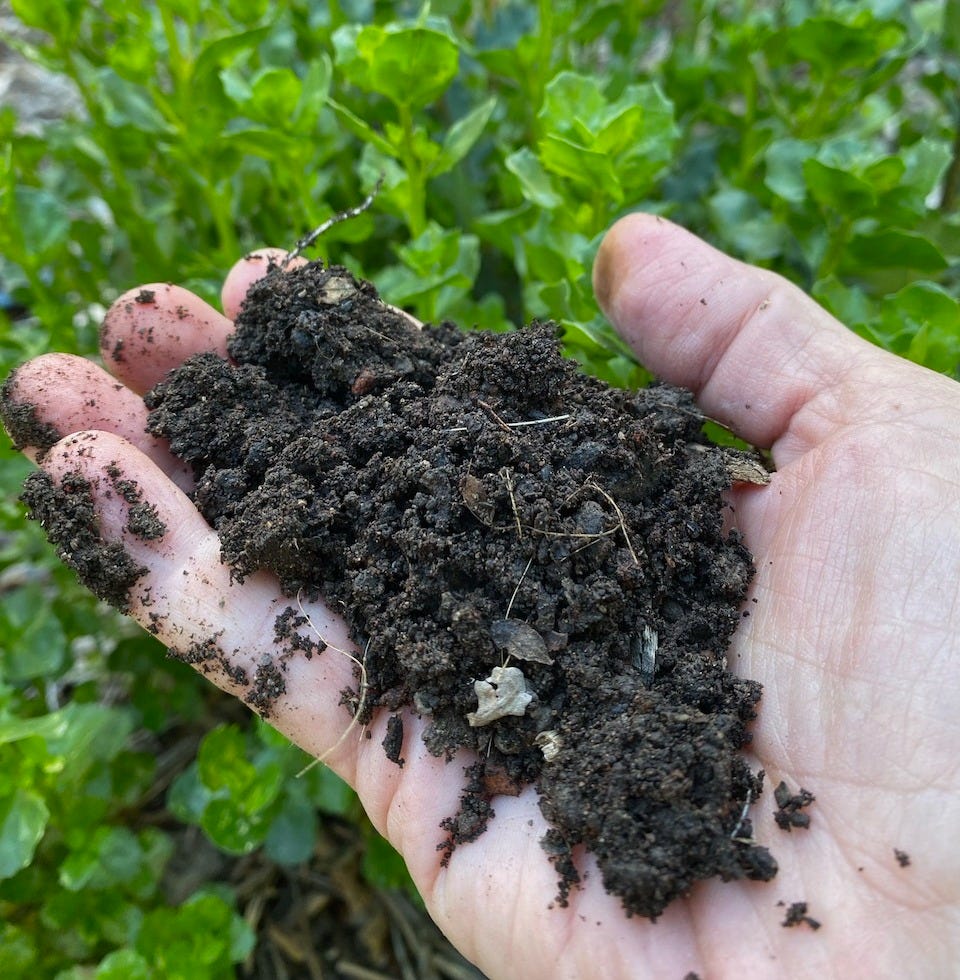Lessons from Compost
Even the smallest efforts have meaning
If you’ve ever stood beside a compost pile on a cool morning, you know the smell—earthy and sweet. Steam rises from the pile like breath. Beneath the surface, banana peels, leaves, and coffee grounds mingle with straw, air and moisture, slowly becoming something rich and dark... and new.
Compost is a magic, sacred process. The alchemy of endings.
In nature, decay is not destruction, it’s transformation. What looks like death is life reorganizing itself.
Spend time near a compost heap and you’ll see it’s a vibrant community of helpers: bacteria, fungi, worms, beetles—all working together. Tiny and industrious, they know their purpose. They’ve been at it since before humans walked the Earth.
Their secret is balance: browns and greens, moisture and air. Too much of one thing, and the pile goes cold. With the right mix, transformation unfolds quietly and beautifully.
We humans can’t force compost to happen, but we can create the conditions for it. And we can participate in the process. We can do our part.
What Compost Teaches
What can we learn from how nature transforms waste into life-giving soil?
In our own lives, we carry layers of experience—fresh green emotions, dry brown memories. When we hold them in balance, life transforms us. When we cling to what should decay, we block the miracle.
Compost teaches patience, humility, and trust in unseen processes. It teaches us that even the smallest efforts have meaning. Think of the earthworms, doing the quiet work of turning what was discarded into nourishment for plants.
The Alchemist
Modern mystic Thomas Berry described Earth as “a communion of subjects, not a collection of objects.” His work taught that the natural world itself is sacred reality—a living revelation.
In 2013, Loretta and I took a journey to several Thomas Berry–inspired eco-spirituality centers across the U.S. This journey was a tribute to her brother John, who had died the year before. Our intention was to retrace his steps.
I used to call John “the ecozoic handyman.” John was extremely handy. He traveled the country offering his gift to these places. Stacking wood for Green Mountain Monastery, fixing plumbing for Genesis Farm, repairing a broken irrigation line at our very own Dancing TreePeople Farm. This was his response to being touched by Thomas Berry’s work.
When Loretta and I arrived at Timberlake Farm Earth Sanctuary in North Carolina, we met Caroline Toben, a close collaborator of Thomas Berry. She offered us a tour on Timberlake, and shared the conversations she had had with Thomas. I was struck by how the very places John had helped repair were still quietly thriving—his handiwork composting into ongoing life. While John had helped with repairs, Carolyn had illuminated Thomas’s work.
Now Carolyn, too, like Thomas, and John, has passed away.
These three reminded me of the helpers in compost. Thomas, John and Carolyn’s gifts live on—quietly nourishing what continues to grow.
Lessons from Sacred Ground
At Dancing TreePeople Farm, I find that the richest soil comes from compost. Each handful holds the memory of everything that came before—leaves, fruit, shells, roots—all merged into one dark, generous body of fertility. It feels and smalls alive.
When I spread that compost in the garden, I think of ancestors, teachers, friends, and seasons past. Their legacy—visible and invisible—have become nourishment for the future.
That is the quiet generosity of compost. It asks nothing but participation.
It says, “Give back what you no longer need, and life will do the rest.”
When we add our own scraps—our mistakes, our fears, our outdated stories—to the great compost of creation, we become part of Earth’s ongoing prayer for renewal.
When we honor compost as sacred, we make room for life to surprise us again.
From Decay to Fertility
By spring, the steam has faded from the pile. I plunge my hands into what remains—soft, fragrant, teeming with unseen life.
In this sacred cycle, life whispers its most faithful promise:
Nothing is ever truly wasted.
What once seemed dead or discarded becomes the dark soil of renewal. The alchemy turns waste into food for what comes next, endings into beginnings.
I’ll close with a few excerpts from Carolyn Toben’s book. Recovering a Sense of the Sacred: Conversations with Thomas Berry.
Thomas: “We need to talk about what to tell future generations, don’t we?
Carolyn: “... what can we tell succeeding generations…about the way into the future…
Thomas paused for a long time and finally began:
“Tell them in the darkness of this time, a vast transformation is occurring in the depths of human consciousness, which is leading to the recovery of the soul, the earth, the universe and a sense of the sacred.
…
Tell them they will meet great companions along the way, including those that burrow in the soil, fly in the air and swim in the sea.
…
Tell them that each of them has a unique part to play in this period of great transition and that each of them brings specialized emotions and imagination to this time and very different ways of knowing.
…
Tell them they can learn to honor all processes of life, even the most difficult.



